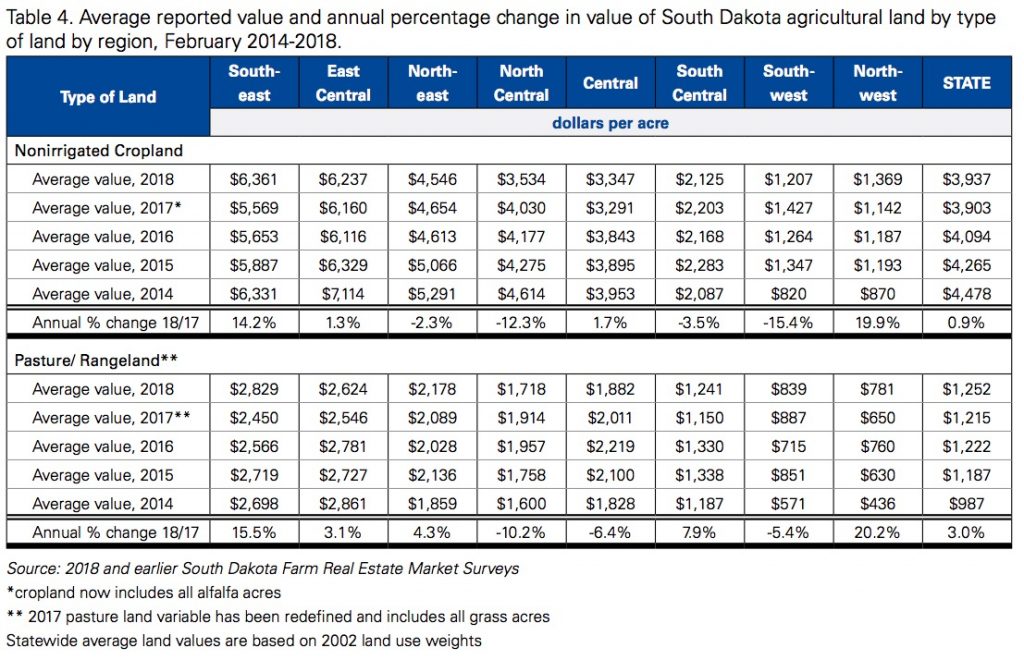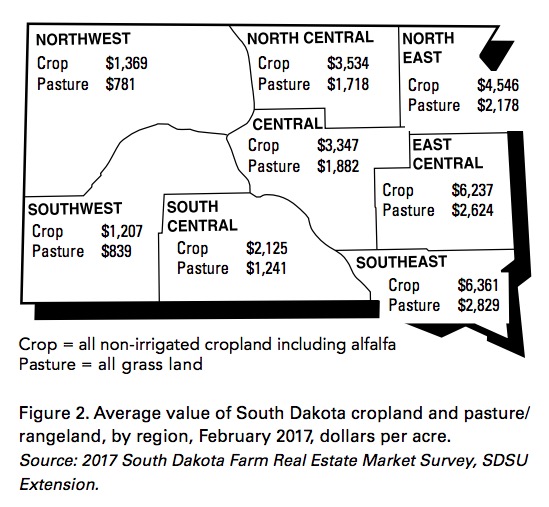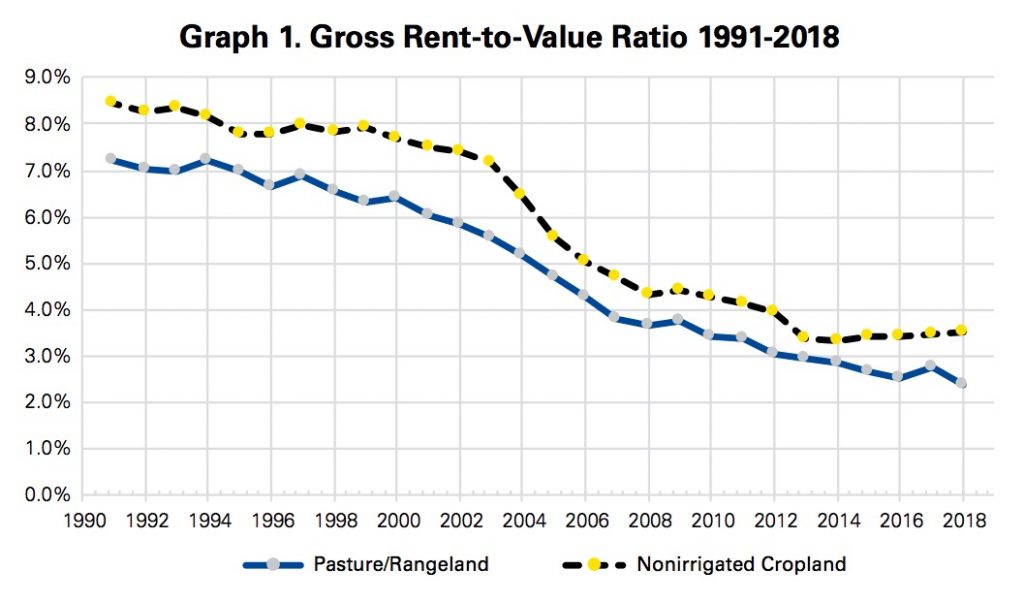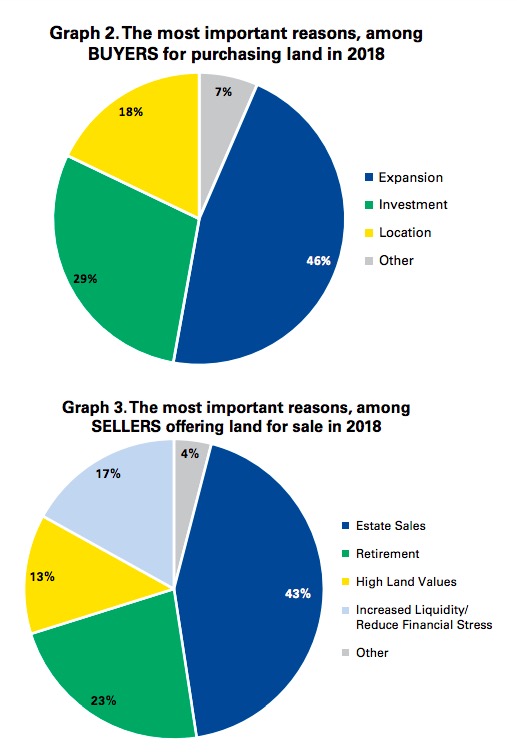Last updated on 2018-09-25
SDSU Extension has released its latest report on agricultural land values in South Dakota. Amid wide regional variations in changes in value of cropland and pastureland, the new report shows that the statewide average value of non-irrigated cropland has increased only 0.9% since last year, while the value of pasture and rangeland has increased 3.0%.

The southeast and northwest corners of the state saw cropland and pastureland jump in value by double-digit percentages; the north central and southwest regions lost value in both categories.

Ag land values have hit a plateau in the last five years. Since 1991, the average annual percentage change in nonirrigated agricultural land values across the state has been 9.7%. That long-term rate has been far more consistent across regions than this year’s fluctuations:
- Northwest: 8.7%
- Southeast: 8.9%
- Southwest: 9.3%
- South Central: 9.4%
- Northeast: 9.5%
- East Central: 9.6%
- Central: 10.1%
- North Central: 10.8%
The gross rate of return, or rent-to-value ratio, for farmland remains below 4% for non-irrigated cropland and below 3% for pasture and rangeland. Don’t blame tariffs for that: rates of return have been sliding since the 1990s, when landlords could make 7% or 8% on their land.

Out of the 143 appraisers, Farm Service agents, bank loan agents, and other respondents to the SDSU Extension survey, 76% named low margins from declining commodity prices as the main negative factor in the ag land market. As always, the most common response to low margins is to expand operations. Expansion motivated 46% of ag land purchases.

Even faced with these economic difficulties, the majority of farmers getting out of the business are either retiring or dead: retirement accounted for 23% of ag land sales, while estate sales accounted for 43%.
Any data on how many farms had to be sold just to pay the estate tax?
mfi, NOem is still alive. As she is the only one in South Dakota that would need to pay that yuuuuge estate tax…then none.
My father in law always said, “don’t sell the land, there is no more being made”
I came here to post; however, after reading MFI’s comment, I see that that the walk-off homer has been hit. Well done, my friend!
You likely already caught this typo, but you listed 9% rather than .9% for increase in crop ground.
Here’s a funny side-note on mike’s witty and brief joke: the 2018 tax change has made estate tax planning even harder for farmers (and everyone with a taxable estate). At least last year, and most previous years, things were somewhat certain regarding the estate tax exemption and the inflation-driven annual increase in the exemption. Now, we are in an environment where we have a crazy-high exemption, but it is set to cut in half in less than a decade. So aging farmers have to ask themselves this question: do i root for myself to die in less than 8 years to benefit from the high exemption, or do i spend time and money planning for the estate tax to come back down, which expenditure may or may not provide any benefit due to the uncertainty of the future exemption?
Thanks, idiots in Washington. You did something else you couldn’t afford, so it’s “the future’s” problem, right? Awesome.
mfi, did you see the 4 page China ad in to the Des Moines Register? China is putting the blame squarely where it belongs, on trump republicans and rightfully so.
“The four-page section in Sunday’s Des Moines Register, which carried the label “paid for and prepared solely by China Daily, an official publication of the People’s Republic of China,” featured articles including one outlining how the trade dispute is forcing Chinese importers to turn to South America instead of the US for soybeans.”
Haven’t seen it, Jerry. I wonder why China doesn’t kick our Ambassador Terry Eugene Braindead back to iowa.
Everyone can see how often farmers punch themselves in the face, over and over, and over again. When are they going to quit punching themselves instead of whining about how, “it’s the liberals fault!”?
I’m sick of it, and I’m sick of their dumb asses reaching out to screw far more people than just their very own selves – yet SOME, surely, are good people.
it looks to me that corporate agriculture is taking over rural america.most of the rural people i know are due to follow our native brothers & sisters who were forced from the land !
What is your definition of corporate agriculture Marvin?
Give us some examples?
Little Russian, what banking hedge fund entity and/or insurance company do you want listed first.